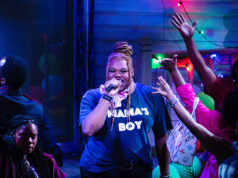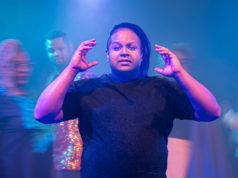With a relatively small collection of scripts to her name, New York playwright Sarah Ruhl has been praised as one of the premier American stage scribes of the still-young 21st century. She studied at Oxford, won the prestigious Susan Smith Blackburn Prize, and was a Pulitzer finalist for drama. After catching Stage West’s clean, bright staging of her alt-reality comedy Dead Man’s Cell Phone – a Texas premiere – let me just say: I don’t get it.
 My reaction to last year’s Stage West production of another ditzy, skin-deep Ruhl script, The Clean House, was also that of bafflement. The success of these two plays may be a case of theater boosters willfully mistaking intention for execution. Because theater is such an underappreciated art form in this country, stage loyalists – including artistically inclined producers, directors, and critics – can be a tad too enthusiastic about any author who pours as much imagination and effort into her work as Ruhl does. Her quick shifts of tone, time, and space seem inspired in part by the flexibility of digital media: With the perennial declaration that theater is dying, Ruhl seems like just the kind of playwright to save the stage from its own real-time, landlocked limitations.
My reaction to last year’s Stage West production of another ditzy, skin-deep Ruhl script, The Clean House, was also that of bafflement. The success of these two plays may be a case of theater boosters willfully mistaking intention for execution. Because theater is such an underappreciated art form in this country, stage loyalists – including artistically inclined producers, directors, and critics – can be a tad too enthusiastic about any author who pours as much imagination and effort into her work as Ruhl does. Her quick shifts of tone, time, and space seem inspired in part by the flexibility of digital media: With the perennial declaration that theater is dying, Ruhl seems like just the kind of playwright to save the stage from its own real-time, landlocked limitations.
Because a lot of people want Ruhl to succeed in her ambitions, they find euphemisms for her technical sloppiness and flat, self-infatuated humor. The flow of her short, choppy, underdeveloped scenes can euphemistically be called “elliptical.” Her thinly conceived characters here – a fearsome, bourbon- swilling matriarch; a sexually and creatively repressed widow; a glib, fast-talking black-market salesman – could kindly be described as “archetypes” that the author manipulates through absurdist “existential” situations. The latter can also be found in the tarted-up sketch comedy that Woody Allen and Steve Martin have previously disguised as high-concept theatrical pieces.
Watching Jim Covault’s otherwise snappy, polished direction of Dead Man’s Cell Phone, it dawned on me why this show moved from unsatisfying to annoying before the first act was over. The actors at work here are so painfully superior to the script, they inadvertently reveal the playwright’s missed opportunities for connections between characters and audience. The performers’ assured charm throws a harsh light on Ruhl’s general inability to make these roles sympathetic or even convincing.
Set designer Covault has created a pale, simple set with a long window backdrop that mimics the sweeping, lonely views of Edward Hopper paintings. The first scene is in fact set in a city diner, where Jean (Dana Schultes) discovers that nearby patron Gordon (Michael Corolla) won’t answer his ringing cell phone because he’s sitting there dead. She does answer the thing – and keeps answering it throughout the show — which hurls her into the complicated grieving processes of several characters: Gordon’s mother, Mrs. Gottlieb (an arch, viper-tongued Sylvia Luetdke); his widow, Hermia (Emily Scott Banks, slowly thawing from deep resentment); his mistress (the authentically glamorous Elizabeth Van Winkle-Haberkorn); and his little brother, Dwight (Dan Forsythe, who easily locates the intersection of dweebish and delightful). Then Gordon returns from the dead, and soliloquies about lobster bisque, organ transplants, and (of course) the allegedly mystical nature of cell phone communications follow. Jean takes jaunts to purgatory, a place inexplicably filled with dancers, and to Johannesburg, where she tangles with a greedy organ donor. Two hours are filled, but little else is accomplished or revealed.
In the mostly reactive role of Jean, Dana Schultes unwittingly becomes this production’s biggest bullshit detector. Schultes, as always, is radiant – she conveys intelligence and self-deprecation without breaking a sweat. You could call her character Jean a “people pleaser” – she constantly invents soothing words and scenarios for Gordon’s survivors – but there is otherwise no solid motivation for why she is constantly inserting herself into the troubles of strangers, even risking her life in the process. “Because the playwright wants to break the rules of narrative and natural law” doesn’t cut it as an explanation. Impulse, dream logic, and poetic adventure can take flight only if they’ve got firm ground from which to depart. Beckett and Ionesco are funny and haunting precisely because their characters are so coated in the muck of human foibles. Dead Man’s Cell Phone, on the other hand, is antiseptic and over-determined and always unlikely. Despite her warmest efforts, Dana Schultes is placed wherever Ruhl wants her on the board, but there is no emotional content in this arbitrary chess game.











